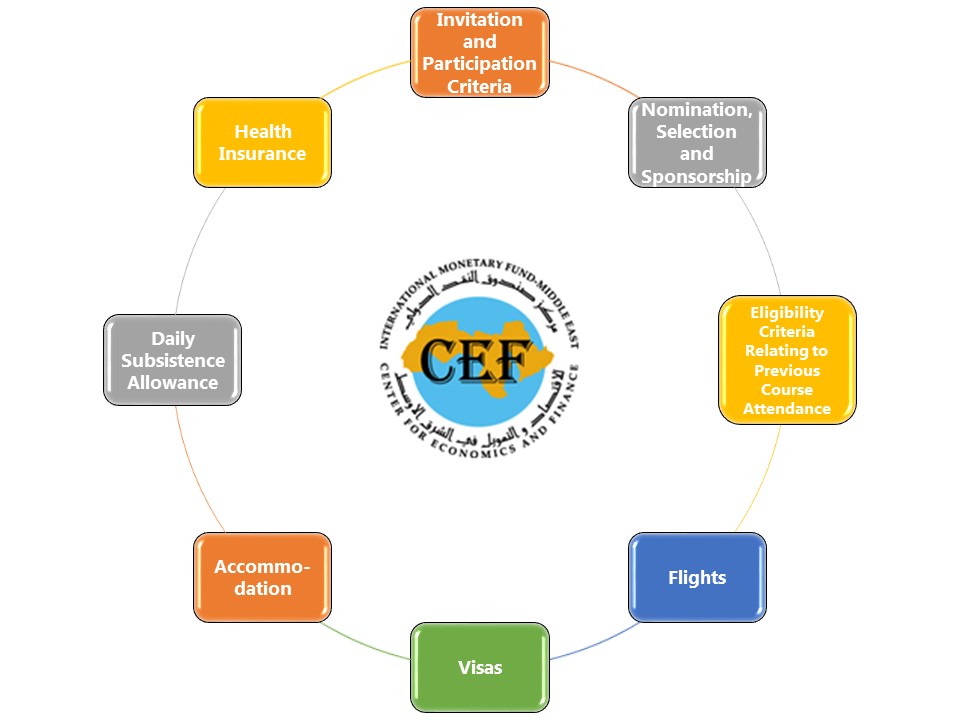Administrative Arrangements
 |
Invitation and Participation Criteria
• The training courses offered at the IMF-Middle East Center for Economics and Finance (CEF) are intended for officials from the Arab League member countries.
• A candidate must be an employee of an eligible governmental agency. The CEF cannot consider applications from persons employed in non-governmental agencies such as universities, trade unions, and commercial banks.
• Admission to these courses is by invitation or application.
• For courses by invitation: CEF addresses invitation letters mainly to central banks and ministries of finance, in addition to other relevant government agencies depending on the topic of the course. Candidates nominated by their respective agencies should follow the nomination procedures outlined in the provided invitation letters.
• For courses by application: Applicants should apply online at the following link. This link contains all courses offered at the CEF by way of the Training Application System (TAS). Applicants should choose which courses are of interest to them and follow the procedures outlined under the IMF Smart Catalogue to submit their applications through OAS.
• For online courses: Online Courses (OL) are free and are open to all government officials of IMF member countries. There are no restrictions on the number of officials who can participate in these courses.
Nomination, Selection and Sponsorship
• All applicants/nominees must submit a valid Sponsor’s Nomination Form signed and stamped by a senior official in the agency where they work. This form proves a candidate is officially endorsed by the government agency and has received approval to attend the course.
• Sponsoring agencies should indicate an order of priority when nominating more than one candidate. Agencies should exercise the greatest care in nominating applicants who meet the selection criteria of academic background and job relevance. They are strongly encouraged to only nominate participants who will be available to serve their government for a reasonable time after receiving the training.
• Fluency in the language of instruction, or interpretation when provided, should be taken into consideration. Most of the courses are conducted in Arabic or English with simultaneous interpretation to both languages. except for specialized courses which are conducted in English only due to their technical nature. Some flagship courses are offered in Arabic only.
• Priority is given to those applicants whose professional assignments are closely related to the subject matter of the course.
• Applications must be submitted to the CEF by the deadline indicated for each course.
• The training mission team assigned to the course is responsible for the final selection of candidates. Once selected, participants will receive detailed information about administrative and other arrangements.
• The accepted applicants are expected to be on leave of absence with regular pay for the duration of the course, and should be given no other duties or assignments during the period of the course.
• Participants are required to arrive on time, attend all sessions, and complete the course. The CEF retains the right to deny an applicant the graduation certificate in case of failure to comply with these requirements.
Eligibility Criteria Relating to Previous Course Attendance
• Due to capacity constraints at the CEF and in view of the high demand for training in the region, previous participation is taken into account when considering nominees for courses. Officials may not take more than two courses per fiscal year, nor take the same course more than once within two consecutive years.
Flights
• The CEF provides all participants with flight tickets to and from Kuwait in economy class. The choice of the ticket follows the Lowest Available Direct Fare (LADF) principle.
• Upon receiving their acceptance letters, participants are responsible for contacting the CEF designated travel agent to arrange for issuing their flight tickets.
• Once the participant accepts the flight option provided by the CEF designated travel agent, he/she would be responsible for covering any charges resulting from changing their ticket.
Visas
• The CEF arranges the issuance of entry visas to Kuwait for all participants, in addition to other documents required by the Kuwaiti authorities. The Course Administrator in charge of the course will communicate these requirements to the accepted applicants upon their selection to attend the course.
• In order to issue a visa, a clear copy of the passport must be provided by the participant.
• The passport must be valid for more than 6 months from the planned entry date to Kuwait.
• Once the visa is issued, a copy is emailed to the participant to be used upon boarding the flight to Kuwait. When the participant arrives into the designated Terminal in Kuwait International Airport, they collect the original visa from the Visa Office in that Terminal.
• The original visa should be submitted to the passport control at the airport upon departure from Kuwait.
Accommodation
• Accommodation during the courses is provided at a local hotel.
• The CEF covers the cost of the accommodation at the hotel including breakfast. Participants are responsible for all other charges, i.e. phone calls, room service…etc.
Daily Subsistence Allowance (Per Diem)
• Each participant, from outside Kuwait, receives a Daily Subsistence Allowance (DSA) intended to cover the cost of dinner and some of the participant’s incidental expenses. Breakfast and lunch are covered by the CEF.
• The DSA might not cover all additional expenses, therefore participants should be prepared to supplement the allowance from their own resources according to their expenditure needs.
Health Insurance
• The CEF provides participants from outside Kuwait with health insurance benefits covering 95% of essential medical and hospital expenses.
• However, these benefits do not cover expenses incurred in connection with pre-existing medical conditions, such as pregnancy; neither do they cover general lab tests and medical checkups.
• Participants should be in good health, free from any contagious diseases, or pre-existing medical conditions that could impair their full participation in the course.
